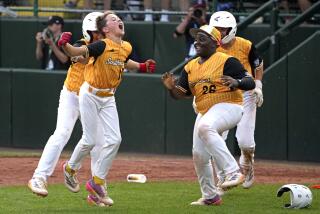Camera, Child’s Play a Bad Mix
- Share via
While wondering how my beloved baseball could have fallen into such disrepair, I turned the television to a national cable channel Friday and was given a hint.
There was a batter tauntingly waving his bat toward the outfield fence.
There was an infielder making a leaping catch, then sticking out his tongue and posing.
One baserunner cockily thumped his hands on his chest. Another mockingly pointed at the losing opponents.
You might think, so this is where baseball has landed, these examples of the needless narcissism that has brought owners and players to the verge of a strike.
Except these were 11-and 12-year-old kids.
Acting for a national television audience.
Their children’s game being broadcast as if they were adults.
The unsettling images of the Little League World Series flashing on ESPN and ABC, this is not where baseball has landed.
This is where that fall begins.
*
Later this week, ABC will proudly announce that it is broadcasting the Little League World Championship game for the 40th consecutive year.
It was wrong then, and it’s wrong now.
The sports giant ESPN proudly advertises that it is broadcasting 26 regional and World Series games leading up to the championship, and this year even added three Little League girls’ softball games.
What’s next, a televised draft to choose which moms bring the snacks?
Putting children’s team sports on display, the cameras urging them to act like adults while exploiting their childhood emotions, is generally considered a lousy idea.
When that sport is baseball, where every success and failure is magnified by its individual nature--where else do little kids risk such an utterly public failure as the strikeout?--the notion becomes pure nonsense.
Yet baseball is the only sport to do it.
There are no live broadcasts of National Pop Warner football championships, or National Junior Basketball title games, or AYSO soccer super bowls.
“The televising of these games gives Little League a powerful vehicle for communicating its philosophy and purpose to more people every year,” Stephen D. Keener, Little League president, said in a statement.
In front of the camera, though, that philosophy changes.
Part of the Little League pledge is, “I will play fair.”
Yet the lure of television has led to several major cheating incidents, with last year’s overage Bronx team the latest example.
The air of distrust is so thick that when an equally diverse team from Harlem qualified for the World Series this year, it was immediately charged with the same sort of cheating, before being cleared.
Another part of the pledge is, “But win or lose, I will always do my best.”
Sorry, now that much of the tournament is on television, losing is no longer an option.
Lose, and the cameras will be acutely focused on the coach’s anger and the children’s pain.
Lose, as a team from Massachusetts lost to a team from Hawaii in the Series opener Friday, and the camera will linger on the face of the pitcher who gives up the game-winning homer.
It was awful to watch young Frank Flynn squirm on the mound after throwing his fateful fastball in the bottom of the final inning. Only after watching his discomfort for several long seconds were we treated to the celebration of Hawaii hitter Travis Jones.
There is a tendency to criticize the networks for showing the games, but, hey, they aren’t forcing Little League to take their money.
“For adults, it’s a chance to bring back memories,” ESPN spokesman Mike Humes said. “For kids, it’s an opportunity to document one of the greatest moments of their lives.”
And people watch, as many as 2.3 million folks for one game last year, equaling the average number of viewers for Major League Baseball.
Here’s hoping Little League is spending that money well, because it certainly comes with a cost.
Announcers talk about the kids as if they’re professionals--”He didn’t want to throw that pitch, he’s really feeling the pressure.”
Some kids scowl and stalk and preen as if they’re professionals.
The individualism that has overtaken the professional game infiltrates Williamsport, Pa., like late-summer humidity.
Back home, playing in front of Mom and Dad and a bunch of kids on bikes, it’s about the team. But once in Williamsport, even an 11-year-old can figure out that the good kids get the air time, the outlandish kids get even more air time, and the weaker kids get embarrassed.
“For many kids, playing on national television is the chance of a lifetime,” said Dr. Todd Boyd, a USC professor who writes about sports and culture. “But this isn’t like playing for Mom and Dad and the neighbors. Once the camera comes on, it becomes a performance. It can make a spectacle for people who are too young to understand its ramifications.”
Five years ago, I was there, writing a column about South Mission Viejo’s apparent world championship.
Until Mexico scored twice in the bottom of the final inning for a stunning victory.
As the cameras focused on our local kids’ tears, and their coach’s frustration, I realized I shouldn’t be there either.
Given the state of Major League Baseball, the worst thing we can do is treat our children like major leaguers.
*
Bill Plaschke can be reached at bill.plaschke@latimes.com.
More to Read
Go beyond the scoreboard
Get the latest on L.A.'s teams in the daily Sports Report newsletter.
You may occasionally receive promotional content from the Los Angeles Times.











